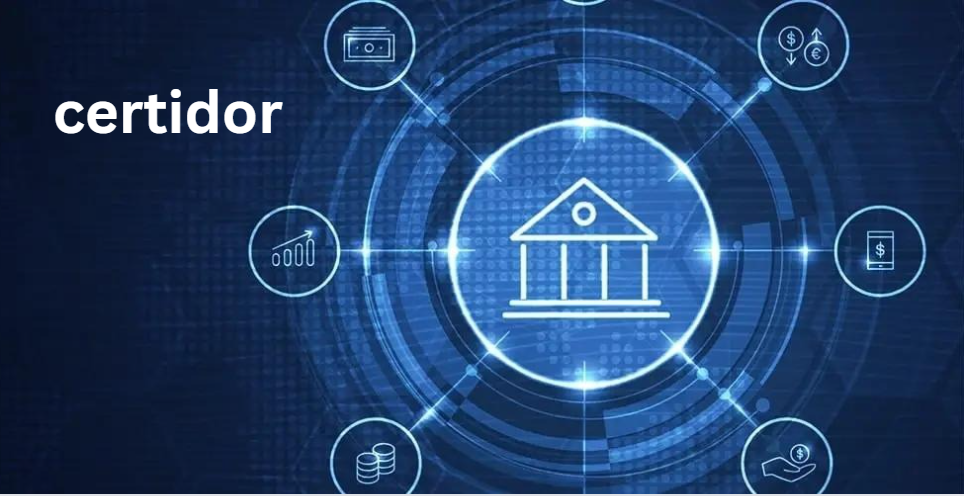The Ultimate Guide to Certidor: Revolutionizing Digital Certifications
In today’s digital age, the need for secure, verifiable, and easily accessible certifications is more critical than ever. Certidor, a cutting-edge platform, has emerged as a game-changer in the field of digital certifications.
This comprehensive guide explores everything you need to know about Certidor, offering unique insights, interpretations, and analyses that go beyond existing online sources.
Contents
Introduction to Certidor
Certidor is a revolutionary platform designed to provide secure, verifiable, and easily accessible digital certifications. Whether it’s academic credentials, professional certifications, or personal achievements, Certidor ensures that these records are stored securely and can be easily verified by employers, educational institutions, and other stakeholders.
Features and Benefits
Certidor offers a wide range of features and benefits that set it apart from traditional certification methods:
1. Security
Certidor uses advanced encryption and blockchain technology to ensure that all certifications are secure and tamper-proof.
2. Verifiability
Each certification issued by Certidor comes with a unique digital signature that can be easily verified by third parties, ensuring the authenticity of the document.
3. Accessibility
Certifications stored on Certidor can be accessed from anywhere in the world, making it easy for individuals to share their credentials with potential employers or educational institutions.
4. Cost-Effective
Certidor eliminates the need for physical certificates, reducing costs associated with printing, storage, and shipping.
5. Eco-Friendly
By going digital, Certidor contributes to environmental sustainability by reducing the need for paper and other physical resources.
How Certidor Works
Step-by-Step Process
- Registration: Users register on the Certidor platform and create an account.
- Certification Issuance: Educational institutions, certification bodies, or employers issue digital certifications through Certidor.
- Verification: Certifications can be verified by third parties using a unique digital signature.
- Access: Users can access and share their certifications through the Certidor platform.
User Roles
- Issuers: Entities that issue certifications, such as universities, professional bodies, and employers.
- Recipients: Individuals who receive and manage their digital certifications.
- Verifiers: Organizations or individuals who verify the authenticity of the certifications.
Security and Verification
Blockchain Technology
Certidor leverages blockchain technology to provide a secure and immutable record of certifications. Each certification is stored in a decentralized ledger, making it tamper-proof and easily verifiable.
Encryption
All data on Certidor is encrypted using advanced cryptographic techniques, ensuring that sensitive information is protected from unauthorized access.
Two-Factor Authentication
Certidor employs two-factor authentication (2FA) to enhance account security, requiring users to provide two forms of identification before accessing their account.
User Experience and Interface
Intuitive Design
Certidor’s user interface is designed to be intuitive and user-friendly, making it easy for users to navigate and access their certifications.
Mobile Accessibility
The Certidor platform is fully responsive and can be accessed on mobile devices, allowing users to manage their certifications on the go.
Customization
Users can customize their profiles and manage their certifications according to their preferences, including setting privacy controls and notification preferences.
Certidor in Different Industries
Education
Certidor is widely used in the education sector to issue and manage academic credentials. Universities and colleges can issue digital diplomas, transcripts, and certificates that are easily verifiable by employers.
Professional Certifications
Professional certification bodies use Certidor to issue and manage certifications for various fields, including IT, healthcare, finance, and more.
Corporate Training
Companies use Certidor to issue certifications for in-house training programs, ensuring that employees’ skills and achievements are verifiable and easily accessible.
Case Studies and Success Stories
Case Study 1: University Adoption
A major university adopted Certidor to issue digital diplomas and transcripts. The move resulted in significant cost savings, enhanced security, and improved verification processes for employers.
Case Study 2: Professional Body Integration
A leading professional certification body integrated Certidor into its certification process, reducing fraud and improving the efficiency of its credentialing system.
Success Story: Corporate Training
A multinational corporation used Certidor to issue certifications for its global training programs, leading to better tracking of employee skills and enhanced recognition of their achievements.
Comparative Analysis
Traditional Certifications vs. Certidor
| Feature | Traditional Certifications | Certidor |
| Security | Vulnerable to tampering | Blockchain-based security |
| Verifiability | Manual verification | Automated digital verification |
| Accessibility | Limited | Global access |
| Cost | High printing and shipping costs | Cost-effective |
| Environmental Impact | Paper-based | Eco-friendly |
Other Digital Certification Platforms vs. Certidor
Certidor stands out among other digital certification platforms due to its advanced security features, user-friendly interface, and widespread industry adoption.
Future Prospects
Expansion of Services
Certidor plans to expand its services to include new types of certifications, such as micro-credentials and badges, catering to the evolving needs of learners and professionals.
Integration with Other Systems
Certidor aims to integrate with other platforms and systems, such as learning management systems (LMS) and human resource management systems (HRMS), to provide a seamless user experience.
AI and Machine Learning
Future updates to Certidor will incorporate AI and machine learning to offer personalized recommendations and insights, enhancing the overall user experience.
Conclusion
Certidor is revolutionizing the way certifications are issued, managed, and verified. With its advanced security features, user-friendly interface, and wide range of applications, Certidor is set to become the gold standard in digital certifications. Whether you’re an educational institution, a professional certification body, or a corporate entity, Certidor offers a secure, cost-effective, and eco-friendly solution for managing certifications.
FAQs
Q: What is Certidor?
A: Certidor is a cutting-edge platform designed to provide secure, verifiable, and easily accessible digital certifications.
Q: How does Certidor ensure the security of certifications?
A: Certidor uses blockchain technology, advanced encryption, and two-factor authentication to ensure the security and authenticity of certifications.
Q: Who can use Certidor?
A: Certidor is used by educational institutions, professional certification bodies, corporate entities, and individuals to issue, manage, and verify digital certifications.
Q: How can I access my certifications on Certidor?
A: Certifications can be accessed through the Certidor platform, which is available on both desktop and mobile devices.
Q: What are the benefits of using Certidor over traditional certifications?
A: Benefits of using Certidor include enhanced security, easy verification, global accessibility, cost savings, and reduced environmental impact.
Q: What future developments can we expect from Certidor?
A: Future developments include the expansion of services to include new types of certifications, integration with other systems, and the incorporation of AI and machine learning.

